| Listing 1 - 10 of 26 | << page >> |
Sort by
|
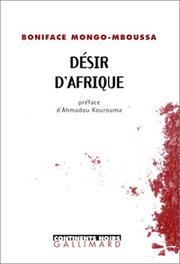
ISBN: 2070764028 9782070764020 Year: 2001 Publisher: Paris: Gallimard,
Abstract | Keywords | Export | Availability | Bookmark
 Loading...
Loading...Choose an application
- Reference Manager
- EndNote
- RefWorks (Direct export to RefWorks)
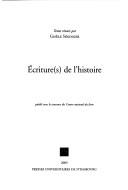
ISBN: 2868202829 9782868202826 Year: 2006 Publisher: Strasbourg: Presses universitaires de Strasbourg,
Abstract | Keywords | Export | Availability | Bookmark
 Loading...
Loading...Choose an application
- Reference Manager
- EndNote
- RefWorks (Direct export to RefWorks)
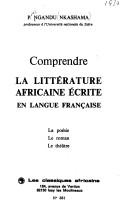
ISBN: 2850491616 9782850491610 Year: 1979 Volume: 851 *4 Publisher: Issy les Moulineaux: Saint-Paul,
Abstract | Keywords | Export | Availability | Bookmark
 Loading...
Loading...Choose an application
- Reference Manager
- EndNote
- RefWorks (Direct export to RefWorks)
African literature (French) --- History and criticism. --- Sembène --- Littérature africaine --- African literature (French) - History and criticism. --- Théâtre --- Poésie --- Littérature
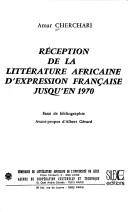
ISBN: 2903871094 9782903871093 Year: 1982 Publisher: Paris: Silex,
Abstract | Keywords | Export | Availability | Bookmark
 Loading...
Loading...Choose an application
- Reference Manager
- EndNote
- RefWorks (Direct export to RefWorks)
Book
ISBN: 2868290612 9782868290618 Year: 1992 Publisher: Paris: Arcantère,
Abstract | Keywords | Export | Availability | Bookmark
 Loading...
Loading...Choose an application
- Reference Manager
- EndNote
- RefWorks (Direct export to RefWorks)
--Maghreb --- --Littérature nord-africaine d’expression française --- --North African literature (French) --- Littérature française --- North African literature (French) --- History and criticism --- Bibliography --- French literature --- Africa [North ] --- Littérature nord-africaine d’expression française --- North African literature (French) - History and criticism --- North African literature (French) - History and criticism - Bibliography --- Maghreb
Book
ISSN: 12622850 ISBN: 2745311921 9782745311924 Year: 2005 Volume: 57 Publisher: Paris: Champion,
Abstract | Keywords | Export | Availability | Bookmark
 Loading...
Loading...Choose an application
- Reference Manager
- EndNote
- RefWorks (Direct export to RefWorks)
French literature (outside France) --- Fiction --- Thematology --- Africa in literature --- Afrika in de literatuur --- Afrique dans la littérature --- African literature (French) --- History and criticism --- African literature --- African literature (French) - History and criticism --- Littérature --- Afrique
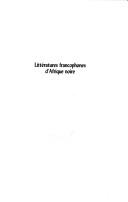
ISBN: 9782744906282 274490628X Year: 2006 Volume: *4 Publisher: Aix-en-Provence: Édisud,
Abstract | Keywords | Export | Availability | Bookmark
 Loading...
Loading...Choose an application
- Reference Manager
- EndNote
- RefWorks (Direct export to RefWorks)
Alors que Picasso et ses amis découvrent l'art nègre, sur fond de rythmes venus d'outre-atlantique, c'est en 1921 que les jurés du prix Goncourt portent leur choix sur un écrivain de couleur, le guyanais René Maran, auteur de Batouala, sous-titré " véritable roman nègre ". l'événement qui fait scandale, marque le coup d'envoi d'un vaste mouvement de reconnaissance et d'affirmation des valeurs culturelles du monde noir qui va bientôt triompher sous la bannière de la négritude, brandie conjointement par Léopold Sédar Senghor, Aimé Césaire et Léon-Gontran Damas. Ces pionniers qui ont fait le choix de la poésie pour dire leur révolte et leurs espoirs, ne tardent pas à être relayés par plusieurs générations de dramaturges et de romanciers attachés à réhabiliter des sociétés trop longtemps marginalisées, à en décrire les mécanismes complexes et à dénoncer des dérives autant coloniales que post-coloniales. alors qu'au seuil des années quatre-vingt émerge enfin une littérature féminine, aux accents contestataires, les écrivains, pour la plupart, s'émancipent progressivement des idéologies qui avaient marqué les premières oeuvres, et s'engagent dans une aventure des écritures traduisant l'entrée des littératures africaines dans une modernité textuelle ouverte à tous les souffles du monde.
African literature (French) --- History and criticism --- 840 <6> --- Franse literatuur--Afrika --- 840 <6> Franse literatuur--Afrika --- African literature (French) - History and criticism --- Littérature coloniale --- Littérature orale --- Théâtre --- Poésie --- Politique --- Obscénité --- Afrique --- Littérature --- Histoire --- Négritude --- Guerre --- Génocide --- Mythe
Book
ISBN: 0253205697 0253331242 Year: 1990 Publisher: Bloomington Indiana University Press
Abstract | Keywords | Export | Availability | Bookmark
 Loading...
Loading...Choose an application
- Reference Manager
- EndNote
- RefWorks (Direct export to RefWorks)
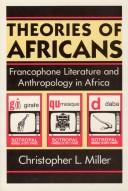
ISBN: 0226528014 Year: 1990 Publisher: Chicago London University of Chicago Press
Abstract | Keywords | Export | Availability | Bookmark
 Loading...
Loading...Choose an application
- Reference Manager
- EndNote
- RefWorks (Direct export to RefWorks)
African literature (French) - History and criticism - Theory, etc. --- Literature and anthropology - Africa, French-speaking West. --- Africa, French-speaking West - Intellectual life. --- Mandingo (African people) - Intellectual life. --- Africa, French-speaking West, in literature. --- Mandingo (African people) in literature.
Book
ISBN: 9781781380345 1781380341 9781781385906 1781385904 1781387184 9781781387184 1800348843 Year: 2014 Volume: 5(2014) Publisher: Liverpool: Liverpool university press,
Abstract | Keywords | Export | Availability | Bookmark
 Loading...
Loading...Choose an application
- Reference Manager
- EndNote
- RefWorks (Direct export to RefWorks)
What does Afro-Europe signify? This volume explores the concept and possibility of a black European community by analysing the ways in which contemporary Francophone African writers articulate and interrogate their complex relationships with European society, culture and history. Through the different contributions in this volume, readers will discover the symbiotic ways in which Africa has transformed/been transformed (in/by) Europe and in turn how Africanness has (re)defined Europeanness. To this end, the volume places scholarly articles addressing the relationship between the francophone and Afro-European context alongside new, specially commissioned short stories and essays by some of the most critically-acclaimed and influential producers of Afropean writing today: Fatou Diome, Alain Mabanckou, Léonora Miano, Wilfried N'Sondé, Sami Tchak and Abdourahman Waberi. Works by these authors are discussed in and across the scholarly interventions, generating dialogue around what it means to be 'Francophone' and 'Afropean' in the twenty-first century. At a time when it is no longer easy to define what Europe really is, this book considers to what extent the category 'Afropean' may prove helpful in improving our understanding of the complex ways in which minority communities conceive of identity in Europe today and address the range of issues impacting them. The notion of 'Afropeanism' is of course relatively new, and this book does not claim to offer an exhaustive analysis of the term's usage and/or potential pertinence. Rather, the cultural, political, and social circumstances of Europe today are reflected in discussions surrounding the term and perhaps not surprisingly, in the diverse and diverging perspectives adopted by the scholars and creative writers in this volume.
French literature (outside France) --- Comparative literature --- Africa --- Europe --- African literature (French) --- History and criticism --- In literature --- Civilization --- Western influences --- African influences --- History and criticism. --- In literature. --- Western influences. --- African influences. --- European influences --- Occidental influences --- African literature (French) - History and criticism --- Europe - In literature --- Africa - Civilization - Western influences --- Europe - Civilization - African influences
| Listing 1 - 10 of 26 | << page >> |
Sort by
|

 Search
Search Feedback
Feedback About UniCat
About UniCat  Help
Help News
News